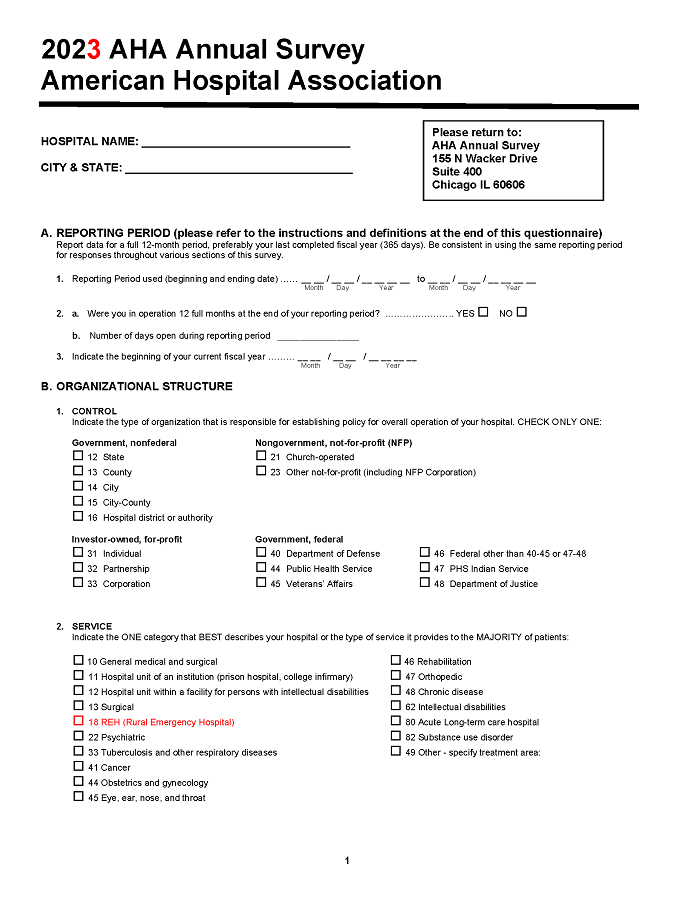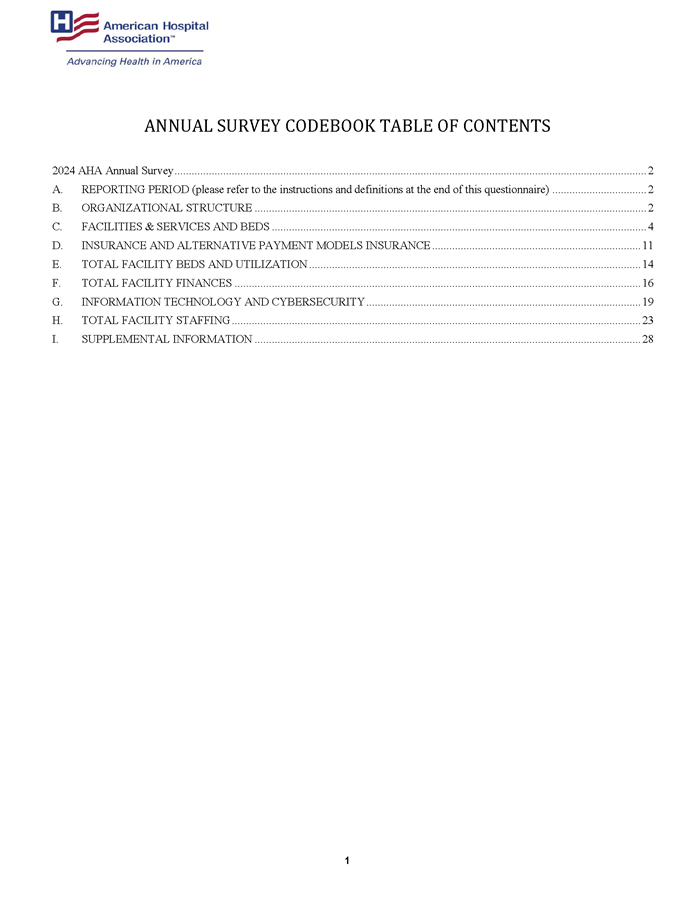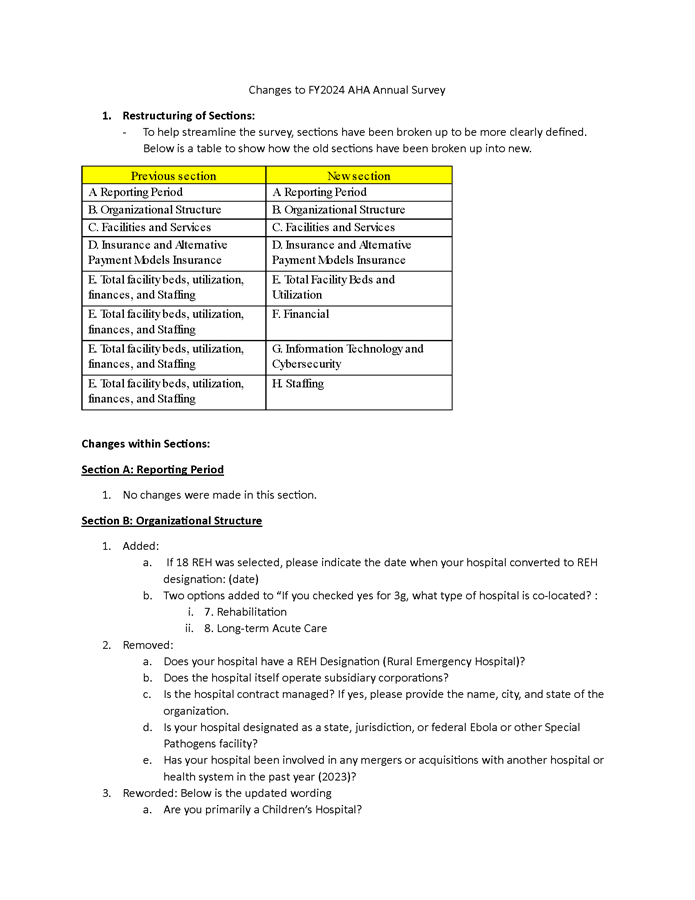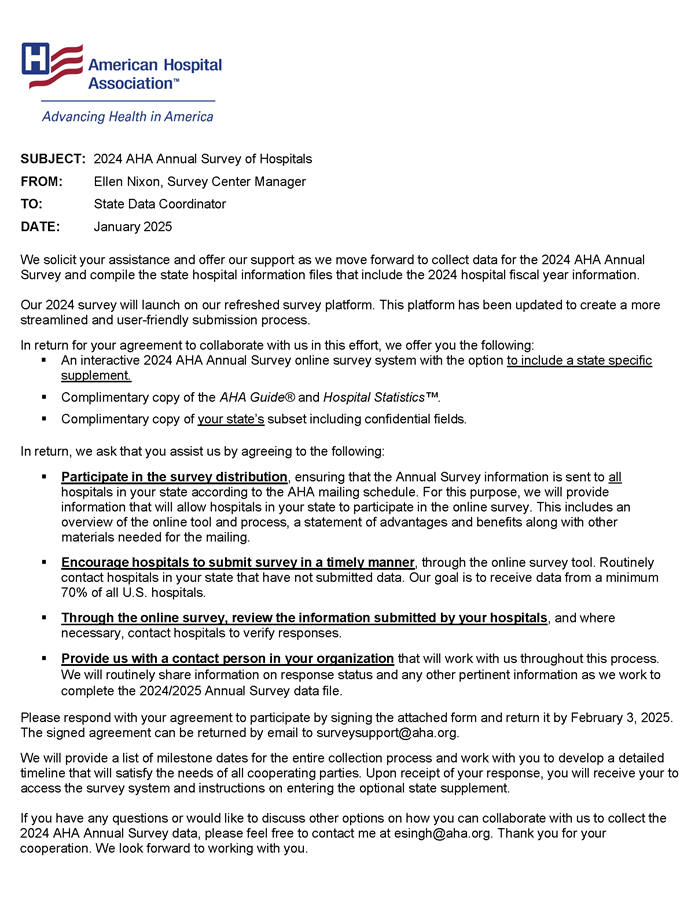The American Hospital Association Annual Survey
What Is the AHA Annual Survey?
American Hospital Association (AHA) has disseminated and collected the AHA Annual Survey since 1947. Each year the AHA works closely with our policy team and other key subject matter experts to refine the survey so that it aligns with key issues. Widely recognized as the most consistent and credible source of information about America’s hospitals, the survey reaches more than 5,000 hospitals and 400 health systems and yields a response rate of over 70%. There are over 1,300 hospital data points collected directly from hospitals. Data points collected include those related to facilities and services, staffing, utilization, organizational structure, social determinants of health, as well as other areas. This data is collected at the hospital level and goes through rigorous data quality procedures to ensure the cleanest, most accurate data set possible.
The American Hospital Association (AHA) Annual Survey is an important source of provider data and the source for AHA Guide®, Hospital Statistics™ and numerous academic studies. It is vitally important to collect accurate and current information about your organization each year, and your response ensures that your hospital’s information will be represented in these field-defining resources.
Why the Annual Survey Remains Important
Health care leaders, policy makers and researchers use the AHA Annual Survey to accurately describe and better understand the operations of U.S. hospitals. The data and insights drawn from the survey also support a number of important AHA initiatives, including advocacy initiatives and assessment of the impact of legislative and regulatory policy changes. The survey provides an essential tool for educating policymakers about the realities that face America’s hospital and health system leaders as they care for their patients and communities.
To see other ways the AHA data is used both internally for advocacy and externally you can explore the AHA Resource Center.
Changes to FY2024 AHA Annual Survey
This document provides all removed, moved, re-worded and added questions to the annual survey this year, broken out by each section.
Annual Survey Questions
A: Yes, there will be overlap this year due to drilling down by staff category.
A: Clinicians work directly with patients rather than in a lab, community health setting or in research.
A: F.1.o.1 is a percentage of <strong>total operating revenue.</strong>
A: Yes, H1r is a breakout of All Other (above), and should include all roles that have tech in their name.
A: No, it is under wrong heading.
A: Physicisans that are hired by both the hospital and the system should only be reported at the hospital level and not at the system level. So, only physicians that are solely hired by the system should be reported under the system.
A: For H. 5. Hospitalists, it would be any hospitalists that provide care within in the hospital regardless of payroll. This would be the same for H.5. Intensivists.
A: We are not using the legal definition so Clinical Pharmacy Specialists can be reported under CPP.
A: International medical graduates would include any staff member that provided care to patients during their reporting period that was born and received their medical degree in a foreign country.
A: No, CNS should be included in H.1.n (all other) and H.1.r.13 (CNS).
A. Admin and billing would be inclusive of anyone who deals with admin and billing.
A. All roles - clinical and non-clinical. You count all administrative staff, clinical support and non-clinical support, for billing, you count all billing support, provider and non-provider billing support.
A. AHA wants expenses included for revenue cycle management staff and vendor costs, claims processing and coding infrastructure (EHR and integrated billing), coding software, claims denials and appeals handling (staff time, etc.), post-payment audits and reconciliation.
A. If all of the hospitals in the system are carrying out the same AI implementation goals/strategies, then yes, these questions can be answered on a system-level (and therefore each hospital’s survey would have the same answers). However, if there are some hospitals that are not implementing the same AI tools or may be at a different stage (i.e. Testing vs Fully Integrated), please do your best to report it accurately for that specific hospital.
A. Volunteer services department is a department with in the hospital dedicated to organizing and facilitating hospital volunteers ( like students etc.), volunteer community organization are organizations that come to healthcare facilities to provide various services. Volunteer services departments would likely handle the scheduling and organization of getting volunteer community organizations in to the hospital to provide services.
A. Examples include Hospice organizations, cancer centers, community health centers, and veteran organizations. Additionally, groups like the Red Cross, Habitat for Humanity, and Doctors Without Borders also provide volunteering opportunities that can extend to healthcare settings. Some organizations may have specific programs, like "Baby Cuddlers" who work with newborns in NICUs. [1, 1, 2, 2, 3, 3, 4, 4, 5, 5] Specific Examples: [6, 6]: Hospice Organizations: Organizations like Hospice provide volunteer opportunities to interact with patients and families during their final stages of life. [6, 6]; Cancer Centers: Organizations like Comprehensive Cancer Centers often have volunteers who assist with various functions, including patient support, administrative tasks, and fundraising. [7, 8, 9, 10]; Community Health Centers: Health clinics and community health centers offer volunteer opportunities to provide direct patient care and support. [1, 1, 2, 11, 12]; Veteran Organizations: Organizations like DAV (Disabled American Veterans) often volunteer at VA hospitals and support veterans and their families. [3, 3]; Red Cross: The Red Cross offers various volunteer opportunities, including healthcare-related roles. [4, 4, 12]; Habitat for Humanity: While not directly in a hospital setting, Habitat for Humanity's construction projects can provide valuable experience for those interested in healthcare-related careers. [4, 4]; Doctors Without Borders: This organization provides medical aid in various countries, offering volunteer opportunities to medical professionals and support staff. [2, 4, 4, 13, 14, 15]; Baby Cuddlers: Some hospitals have specialized volunteer programs like Baby Cuddlers, who provide emotional support and care for newborns in NICUs. [5, 5, 16, 17]
A. Take the data out of that field, save and validate. Then the validation will come back up, and you can put the data back in and provide an explanation.
A. Split them evenly across all hospitals.
A. The word clinician is often used simply to mean "doctor," but it applies to any health professional who works one-on-one with patients, diagnosing or treating illness. A clinician might be a physician or nurse, a psychologist, or a speech-language pathologist.
A. International medical graduates would include any staff member that provided care to patients during their reporting period that was born and received their medical degree in a foreign country.
A. Just International Medical Graduates hired during the reporting period.
A. It includes all contracted staff, both labor and clinical staff. Any one not directly employed by the hospital.
A. This can be reported at system level.
A. It is their internal ranking, not AHA's.
A. Any question marked with an asterisk is confidential and not provided to outside sources or included in the public file. States in a cooperative agreement get all fields and the respondent, but that’s it. If confidential data is ever used internally or by policy, it is always aggregated so that it cannot be determined where the data came from.
A. QIPP should be reported under Medicaid State Directed Payments. ATLIS should not be included as it did not start until 2025. HARP should be reported under Other Medicaid.
A. Contracted physicians would be those that are engaged in clinical practice but are not on payroll. For physicians that are on payroll and contracted, they should be reported above in H.1.a.
A. This question would include any hired first times RNs that would have graduated from an Associates or Bachelors program.
Survey Support
Questions about any of the AHA Surveys? Please reach out to our survey support team at:
- Email: surveysupport@aha.org
- Phone: 1-800-530-9092
For the Annual Survey, each state has a survey analyst assigned to them to help with questions, if you would like to reach out directly to your state analyst for annual survey please refer to the list below.
Survey Analysts by State
| State | State Abbrev | State Analyst First Name | State Analyst Last Name | State Analyst Email |
|---|---|---|---|---|
| Alabama | AL | Evan | Gagnon | egagnon@aha.org |
| Alaska | AK | Evan | Gagnon | egagnon@aha.org |
| American Samoa | AS | Deanna | Frazier | dfrazier@aha.org |
| Arizona | AZ | Danny | Jackson | djackson@aha.org |
| Arkansas | AR | Dena | Giannakopoulos | kgiannakopoulos@aha.org |
| Arkansas | AR | Dena | Giannakopoulos | kgiannakopoulos@aha.org |
| California | CA | Evan | Gagnon | egagnon@aha.org |
| Colorado | CO | Danny | Jackson | djackson@aha.org |
| Connecticut | CT | Dena | Giannakopoulos | kgiannakopoulos@aha.org |
| Delaware | DE | Evan | Gagnon | egagnon@aha.org |
| District of Columbia | DC | Nick | Kirwen | nkirwen@aha.org |
| Florida | FL | Dena | Giannakopoulos | kgiannakopoulos@aha.org |
| Georgia | GA | Evan | Gagnon | egagnon@aha.org |
| Hawaii | HI | Nick | Kirwen | nkirwen@aha.org |
| Idaho | ID | Danny | Jackson | djackson@aha.org |
| Illinois | IL | Evan | Gagnon | egagnon@aha.org |
| Indiana | IN | Deanna | Frazier | dfrazier@aha.org |
| Iowa | IA | Deanna | Frazier | dfrazier@aha.org |
| Kansas | KS | Deanna | Frazier | dfrazier@aha.org |
| Kentucky | KY | Evan | Gagnon | egagnon@aha.org |
| Louisiana | LA | Dena | Giannakopoulos | kgiannakopoulos@aha.org |
| Maine | ME | Nick | Kirwen | nkirwen@aha.org |
| Maryland | MD | Nick | Kirwen | nkirwen@aha.org |
| Massachusetts | MA | Evan | Gagnon | egagnon@aha.org |
| Michigan | MI | Deanna | Frazier | dfrazier@aha.org |
| Minnesota | MN | Deanna | Frazier | dfrazier@aha.org</td> |
| Mississippi | MS | Nick | Kirwen | nkirwen@aha.org |
| Missouri | MO | Dena | Giannakopoulos | kgiannakopoulos@aha.org |
| Montana | MT | Danny | Jackson | djackson@aha.org |
| Nebraska | NE | Deanna | Frazier | dfrazier@aha.org |
| Nevada | NV | Danny | Jackson | djackson@aha.org |
| New Hampshire | NH | Dena | Giannakopoulos | kgiannakopoulos@aha.org |
| New Jersey | NJ | Nick | Kirwen | nkirwen@aha.org |
| New Mexico | NM | Danny | Jackson | djackson@aha.org |
| New York | NY | Dena | Giannakopoulos | kgiannakopoulos@aha.org |
| North Carolina | NC | Nick | Kirwen | nkirwen@aha.org |
| North Dakota | ND | Deanna | Frazier | dfrazier@aha.org |
| Northern Marina Islands | MP | Danny | Jackson | djackson@aha.org |
| Ohio | OH | Nick | Kirwen | nkirwen@aha.org |
| Oklahoma | OK | Nick | Kirwen | nkirwen@aha.org |
| Oregon | OR | Deanna | Frazier | dfrazier@aha.org |
| Pennsylvania | PA | Dena | Giannakopoulos | kgiannakopoulos@aha.org |
| Puerto Rico | PR | Nick | Kirwen | nkirwen@aha.org |
| Rhode Island | RI | Nick | Kirwen | nkirwen@aha.org |
| South Carolina | SC | Evan | Gagnon | egagnon@aha.org |
| South Dakota | SD | Nick | Kirwen | nkirwen@aha.org |
| Tennessee | TN | Nick | Kirwen | nkirwen@aha.org |
| Texas | TX | Danny | Jackson | djackson@aha.org |
| Utah | UT | Danny | Jackson | djackson@aha.org |
| Vermont | VT | Dena | Giannakopoulos | kgiannakopoulos@aha.org |
| Virgin Island | VI | Danny | Jackson | djackson@aha.org |
| Virginia | VA | Evan | Gagnon | egagnon@aha.org |
| Washington | WA | Deanna | Frazier | dfrazier@aha.org |
| West Virginia | WV | Deanna | Frazier | dfrazier@aha.org |
| Wisconsin | WI | Deanna | Frazier | dfrazier@aha.org |
| Wyoming | WY | Danny | Jackson | djackson@aha.org |
Special Opportunity for State Hospital Associations and Departments of Health
The AHA is seeking states to participate in the annual survey via cooperative agreements that help ensure data accuracy and provide valuable state-level analysis.
States that enter into a cooperative agreement with the AHA agree to:
- Support the survey mailing by helping ensure correct contact information for hospitals and distributing survey information to hospitals
- Encourage hospitals to complete the survey
- Review the information submitted by the state’s hospitals
- Provide a contact person from the state hospital organization
In return, the state receives a state-specific supplement, a complimentary digital copy of the AHA Guide and Hospital Statistics, and a complimentary copy of the state’s subset including confidential fields (cybersecurity and financials). Cooperative agreement states are also assigned a survey analyst to help support the state in answering questions and navigating the annual survey.
Blank Letter of Agreement
This is the agreement used between cooperative agreement states and the AHA and outlines the benefits and expectations of a cooperative agreement state.
AHA Help Center
The AHA Help Center provides documentation to help you complete you 2025 AHA Annual Survey and contact information for our Member Support staff.
Other Helpful Links from the AHA Help Center:
- How do I reset my password? – American Hospital Association
- I am trying to reset my password but did not receive a confirmation code email. – American Hospital Association
- Creating an Account – American Hospital Association
- I'm creating an account, but I cannot find my organization. – American Hospital Association
Key Resources
Contents
- What is the AHA Annual Survey?
- Why the Annual Survey Remains Important
- 2025 Annual Survey PDF
- Annual Survey Codebook
- Changes to FY2024 AHA Annual Survey
- AHA Annual Survey FAQs
- Survey Support
- Special Opportunity for State Hospital Associations and Departments of Health
- Blank Letter of Agreement
- AHA Help Center
- Previous AHA Annual Surveys
- Other Helpful Links from the AHA Help Center





